book6 Unit 4_A_Red_Light_for_Scofflaws中英对照
- 格式:doc
- 大小:55.50 KB
- 文档页数:9
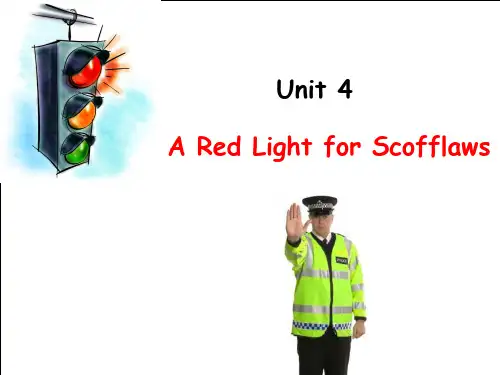
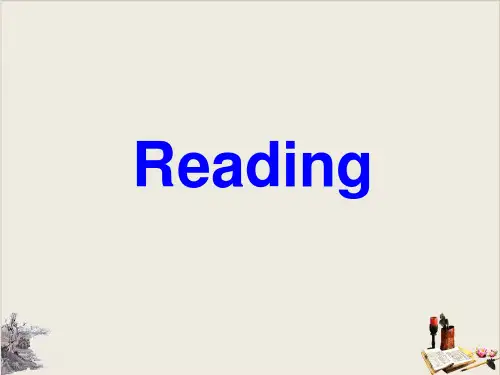
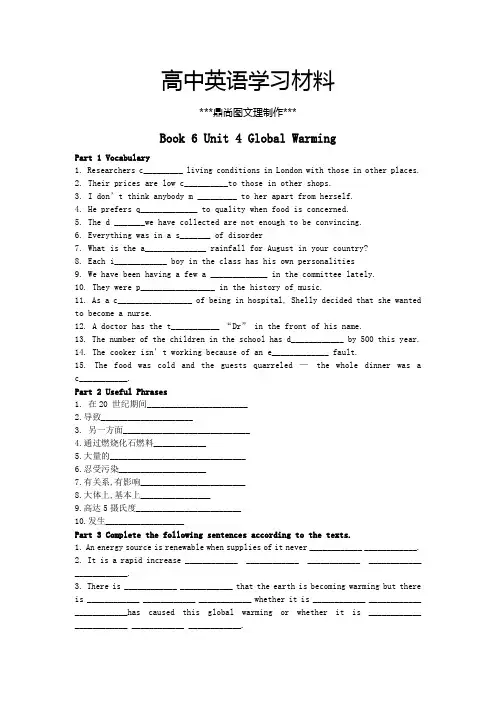
高中英语学习材料***鼎尚图文理制作***Book 6 Unit 4 Global WarmingPart 1 Vocabulary1. Researchers c_________ living conditions in London with those in other places.2. Their prices are low c__________to those in other shops.3. I don’t think anybody m _________ to her apart from herself.4. He prefers q_____________ to quality when food is concerned.5. The d _______we have collected are not enough to be convincing.6. Everything was in a s_______ of disorder7. What is the a______________ rainfall for August in your country?8. Each i____________ boy in the class has his own personalities9. We have been having a few a _____________ in the committee lately.10. They were p_________________ in the history of music.11. As a c_________________ of being in hospital, Shelly decided that she wanted to become a nurse.12. A doctor has the t___________ “Dr” in the front of his name.13. The number of the children in the school has d____________ by 500 this year.14. The cooker isn’t working because of an e_____________ faul t.15. The food was cold and the guests quarreled —the whole dinner was a c___________.Part 2 Useful Phrases1. 在20 世纪期间_______________________2.导致_____________________3. 另一方面_____________________________4.通过燃烧化石燃料____________5.大量的_______________________________6.忍受污染____________________7.有关系,有影响________________________8.大体上,基本上________________9.高达5摄氏度________________________10.发生__________________Part 3 Complete the following sentences according to the texts.1. An energy source is renewable when supplies of it never ____________ ____________.2. It is a rapid increase ____________ ____________ ____________ ____________ ____________.3. There is ____________ ____________ that the earth is becoming warming but there is ____________ ____________ ____________ whether it is ____________ ____________ ____________has caused this global warming or whether it is ____________ ____________ ____________ ____________.4. ____________ the greenhouse effect, the earth ____________ ____________ about thirty-three degrees Celsius____________ ____________ ____________ ____________ ____________.5. The ____________ ____________ of carbon dioxide ____________ that more heat energy is trapped in the atmosphere ____________ the ____________ ____________ ____________ ___________.6. It was ____________ ____________ ____________ Charles Keeling ____________ made ____________ ____________ ____________ the amount of carbon dioxide in the atmosphere from 1957 to 1997.7. They also believe ____________ ____________ the burning of more and more fossil fuels that is ____________ ____________ this increase in carbon dioxide.8. There are some very different ____________ among scientists ____________ ____________ ____________.9. Sometimes I feel that ____________ can’t have any ____________ ____________ ____________huge ___________ problems.9. And, ___________, talk ____________ your family and friends ____________ global warming and tell them what you have learned.10. Remember — your ____________ ___________.Part 4 Multiple Choice1. Is it _______ to you that the government is having a hard time now?A. of much importantB. of much consequenceC. of very importantD. of many consequence2. Something must be done to ______ the river from _________.A. stop; being pollutedB. stop; pollutingC. prevent; pollutionD. keep; polluted3. There ______ quantities of apples in the basket and there was ______ milk in the bucket.A. were; a number ofB. was; quantities ofC. was; a good manyD. were; a quantity of4._______ we get good weather it will be a successful holiday. Which is wrong?A. So long asB. Provided thatC.So longD. On condition that5. —Go for a picnic this weekend, ok?— _______. I love getting close to nature.A. I don’t think so.B. I believe not.C. I couldn’t agree moreD.I am afraid not.6. — Now, where is my purpose?— ________! We will be late for the picnic.A. Come onB. Don’t worryC. Take your timeD. Take it easy.7. It was not until 1999 ________ regular radio broadcast began.A. whileB. whichC.thatD. since8. Can it be in the restaurant _____ we had dinner last Sunday ______ you left your wallet?A.where; whereB. where; thatC. that ; whereD. that; that9. —What’s the matter with you?— ______ the window , my finger was cut unexpectedly.A. CleaningB.To cleanC. While cleaningD. While I was cleaning10. The other day , my brother drove his car down the street at ______ I thought was a dangerous speed.A. asB. whichC. thereD. whatPart 5 Read and then and five questions on the passage, usingorThe little giant panda in the National Zoo in America finally has a name: Tai Shan , which means “peaceful mountain”.The name, one of the five proposed for the little panda, received 44 percent of the estimated 200,000 votes cast on the zoo’s website. The little panda went without a name for his first hundred days in observance of a Chinese custom. It’s rare for pandas, born in captivity, to live more than a few days, and keeping the animals nameless is seen as a way to trick fate into letting them survive.The cub wasn’t present at his naming ceremony. The zoo officials said he probably wouldn’t be making his public debut until some time in December. Panda fans celebrate d Tai Shan’s day at a zoo ceremony featuring performances by Chinese dance troops and martial artists.Tai Shan usually spends the morning with his mother, Mei Xiang. His handlers are slowly introducing him to the exhibit where he’s expected to go on p ublic view within the next couple of months. Mei Xiang and the father, Tian Tian, are on a 10-year loan from China. The cub will be sent to China. when h e is 2 years old.The China Wildlife Conservation Association and the zoo official had selected five names from which voters could choose. The others were: Hua Sheng, Long Shan, and Qiang Qiang1. ________________________________________________________?_______________________________________________________________2. _________________________________________________________?_____________________________________________________________.3. _____________________________________________________________?___________________________________________________________________.4. ____________________________________________________________?__________________________________________________________________. 5. _______________________________________________________________? ___________________________________________________________________. Part 6 Reading: Fill in the blanks after reading the passage according to the letter(s) given.It is almost known to all that smoking is bad for people’s health. Scientific re__________ show that smoking can l______ to heart disease, ca______ and other problems. The world Health Orga_________ says diseases l_______ to smoking kill at l______ two million five-hundred-thousand persons each year.Still, many people find it dif______ to stop smoking. One re________ is thatsmoking usually becomes a hab_______ behaviour, and habits, whether good or bad are not easy to be g______ up. Another reason is the ef______ of nicotine, the substance found in cig________ works on people somewhat as dr______ do.M_________ have been taken to help people ke____ away from the harm of smoking. In many cities, smoking is forbidden in pu_____ places. The danger of smoking is w_____ of everywhere. And newspapers are asked not to publish adver________ for cigarettes. World “No Tobacco Day” is ob________ every year as the biggest campaign ag________ smoking.1.____________2. ____________3.______________4.________________5.____________6.____________7._______________8.________________9.____________ 10.___________ 11.______________ 12._______________13.____________ 14.___________ 15._____________ 16._______________17._____________18.____________ 19.____________ 20._______________Unit 4 Global Warming Book 6Part 1 Vocabulary1. compared2. compared3. matters4. quantity5. data6. state7. average8. individual9. agreements 10. phenomena 11. consequence 12. title 13. decreased 14. electrical 15. catastrophePart 2 Useful Phrases1. during the 19th century2. lead to3. on the other hand4. through the burning of fossil fuels/by burning fossil fuels5. a great deal of/scores of6. put up with the pollution7. make a difference8. on the whole/ roughly9. as much as five degrees Celsius (5°C) 10. come aboutPart 3 Complete the following sentences according to the texts.1. run out2. compared to most natural changes3. no doubt; fierce debate over; human activity that; just a natural phenomenon4. Without; would be; cooler than it is5. increased amount; means; causing; global temperature to go up6. a scientist called; who; accurate measurements of7. it is; resulting in8. attitudes; towards this issue9. individuals; effect on such; environmental 10. importantly; with; about 11. contribution countsPart 4 Multiple Choice1-5 BADCC 6-10 ACBDDPart 5Part 6 Reading: Fill in the blanks after reading the passage according to the letter(s) given.It is almost known to all that smoking is bad for people’s health. Scientific researchers show that smoking can lead to heart disease, cancer and other problems. The world Health Organization says diseases linked to smoking kill at least two million five-hundred-thousand persons each year.Still, many people find it difficult to stop smoking. One reason is that smoking usually becomes a habitual behaviour, and habits, whether good or bad are not easy to be given up. Another reason is the effect of nicotine, the substance found in cigarettes works on people somewhat as drugs do.Measures have been taken to help people keep away from the harm of smoking. In many cities, smoking is forbidden in public places. The danger of smoking is warned of everywhere. And newspapers are asked not to publish advertisements for cigarettes. World “No Tobacco Day” is observed every year as the biggest campaign against smoking.。
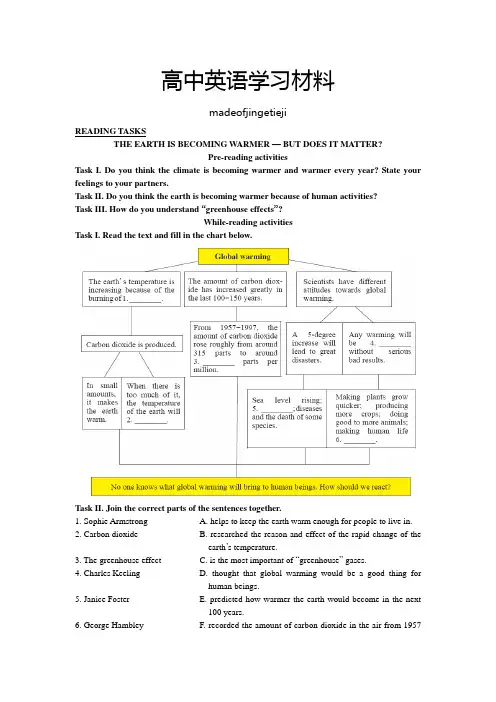
高中英语学习材料madeofjingetiejiREADING TASKSTHE EARTH IS BECOMING W ARMER — BUT DOES IT MATTER?Pre-reading activitiesTask I. Do you think the climate is becoming warmer and warmer every year? State your feelings to your partners.Task II. Do you think the earth is becoming warmer because of human activities?Task III. How do you understand “greenhouse effects”?While-reading activitiesTask I. Read the text and fill in the chart below.Task II. Join the correct parts of the sentences together.1. Sophie Armstrong A. helps to keep the earth warm enough for people to live in.2. Carbon dioxide B. researched the reason and effect of the rapid change of theearth’s temperature.3. The greenhouse effect C. is the most important of “greenhouse” gases.4. Charles Keeling D. thought that global warming would be a good thing forhuman beings.5. Janice Foster E. predicted how warmer the earth would become in the next100 years.6. George Hambley F. recorded the amount of carbon dioxide in the air from 1957to 1997.Task III. Decide which are opinions (O) and which are facts (F).( ) 1. Coal, natural gas and oil are fossil fuels.( ) 2. The “greenhouse effect” is a natural phenomenon.( ) 3. The “greenhouse effect” makes our life worse.( ) 4. The amount of carbon dioxide increased from about 315 parts to about 370 parts per million from 1957 to 1997.( ) 5. Global warming will have a serious effect on human beings.( ) 6. It is not necessary to worry too much about the high level of carbon dioxide.( ) 7. More carbon dioxide will help produce more crops.( ) 8. The earth’s climate will continue to become warmer.Post-reading activitiesTask I. Below is a summary of the text with some words missing. Choose the words from the box and make the summary complete. Then try to retell the story to your partners.cold, diseases, carbon dioxide, warmer, greenhouse, 5The burning of things like natural gas and oil produces gases like 1. ________. These gases trap heat fro m the sun causing a “2. ________ effect”. Small amounts of these gases are good as without them the earth would be too 3. ________. However human activities are producing too much of these gases and they are causing the earth to become 4. ________. Some scientists say that over the next hundred years “greenhouse gases” could warm the earth by as much as 5. ________ degrees Celsius. Some say this would cause floods, droughts and the spread of 6. ________. Others say it would be good for plants and animals. One thing is certain, though, even if the amount of “greenhouse” gases being produced is reduced, the earth will continue to get warmer. (By Ray Cama)Task II. Describe the process of the rising of the earth’s temperature because of the “greenhouse effect”.Task III. Debate. Divide your group into two sides, one agreeing that a 5 degrees increase of the earth’s temperature will lead to a great catastrophe, the other group opposing to it. Each side should state your reasons and try to defeat the other side.Task IV. What can you do to slow down the speed of global warming?参考答案:Pre-reading activitiesTask I. 略Task II. 略Task III.略While-reading activitiesTask I.1. fossil fuels 2. go up 3. 370 4. mild 5. extreme climate 6. betterTask II. 1-B 2-C 3-A 4-F 5-E 6-DTask III. 1. F 2. F 3. O 4. F 5. O 6. O 7. O 8. OPost-reading activitiesTask I. 1. carbon dioxide 2. greenhouse 3. cold 4. warmer 5. 5 6. diseasesTask II. 略Task III.略Task IV. 略。
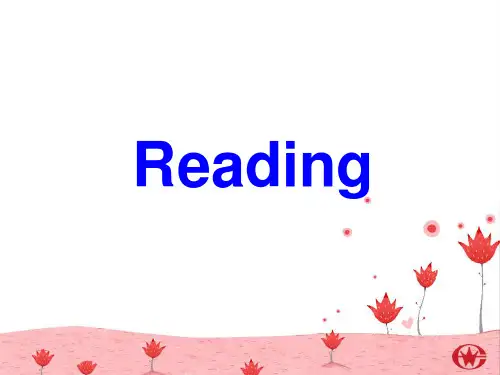
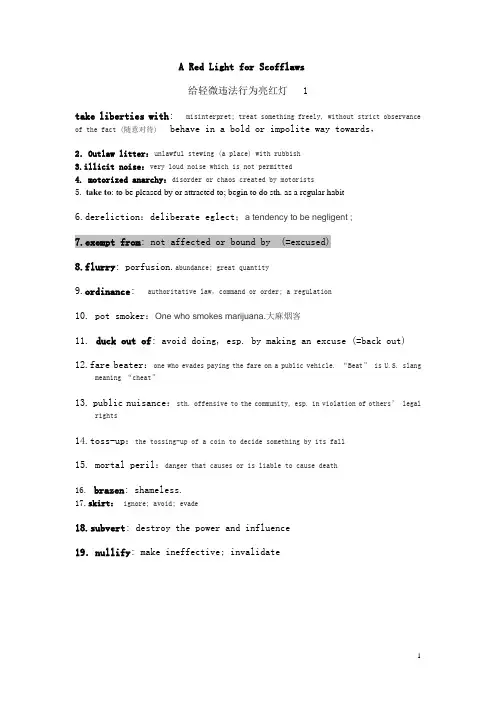
A Red Light for Scofflaws给轻微违法行为亮红灯 1take liberties with: misinterpret; treat something freely, without strict observance of the fact (随意对待) behave in a bold or impolite way towards,2.Outlaw litter:unlawful stewing (a place) with rubbish3.illicit noise:very loud noise which is not permitted4. motorized anarchy:disorder or chaos created by motorists5.take to: to be pleased by or attracted to; begin to do sth. as a regular habit6.dereliction:deliberate eglect;a tendency to be negligent ;7.exempt from: not affected or bound by (=excused)8.flurry: porfusion.abundance; great quantity9.ordinance: authoritative law,command or order; a regulation10. pot smoker:One who smokes marijuana.大麻烟客11.duck out of: avoid doing, esp. by making an excuse (=back out)12.fare beater:one who evades paying the fare on a public vehicle. “Beat” is U.S. slangmeaning “cheat”13. public nuisance:sth. offensive to the community, esp. in violation of others’ legalrights14.toss-up:the tossing-up of a coin to decide something by its fall15. mortal peril:danger that causes or is liable to cause death16.brazen: shameless.17.skirt:ignore; avoid; evade18.subvert: destroy the power and influence19.nullify: make ineffective; invalidateLaw-and-order is the longest-running and probably the best-loved political issue in U.S. history. Yet it is painfully apparent that millions of Americans who would never think of themselves as lawbreakers, let alone criminals, are taking increasing liberties with the legal codes that are designed to protect and nourish their society.法律和秩序,可以说是美国历史上历时最久、或许还是人们最爱谈论的政治问题。
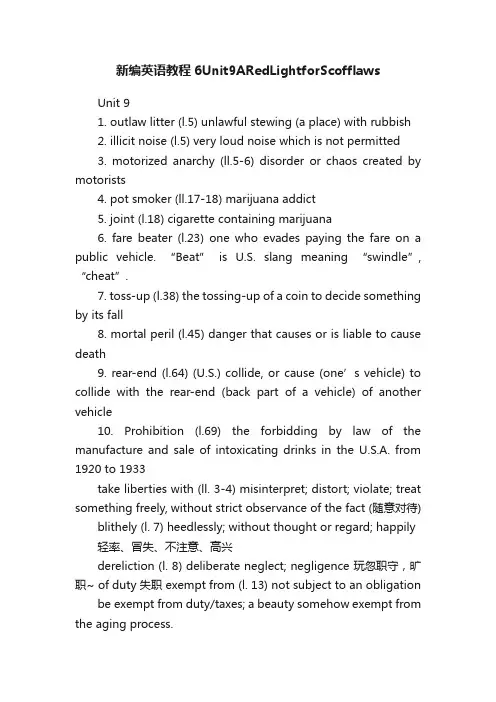
新编英语教程6Unit9ARedLightforScofflawsUnit 91. outlaw litter (l.5) unlawful stewing (a place) with rubbish2. illicit noise (l.5) very loud noise which is not permitted3. motorized anarchy (ll.5-6) disorder or chaos created by motorists4. pot smoker (ll.17-18) marijuana addict5. joint (l.18) cigarette containing marijuana6. fare beater (l.23) one who evades paying the fare on a public vehicle. “Beat” is U.S. slang meaning “swindle”, “cheat”.7. toss-up (l.38) the tossing-up of a coin to decide something by its fall8. mortal peril (l.45) danger that causes or is liable to cause death9. rear-end (l.64) (U.S.) collide, or cause (one’s vehicle) to collide with the rear-end (back part of a vehicle) of another vehicle10. Prohibition (l.69) the forbidding by law of the manufacture and sale of intoxicating drinks in the U.S.A. from 1920 to 1933take liberties with (ll. 3-4) misinterpret; distort; violate; treat something freely, without strict observance of the fact (随意对待) blithely (l. 7) heedlessly; without thought or regard; happily 轻率、冒失、不注意、高兴dereliction (l. 8) deliberate neglect; negligence 玩忽职守,旷职~ of duty 失职 exempt from (l. 13) not subject to an obligation be exempt from duty/taxes; a beauty somehow exempt from the aging process.免去义务/免税;永恒之美flurry (l. 14) 1) abundance; great quantity 2) 暴雨、风、雪;阵风3) 慌张ordinance (l. 15) authoritative command or order; a statute or regulationflagrant (l. 18) shameless; notoriousa flagrant offence 大罪, 重罪flagrant crime 滔天罪行a flagrant error明显的错误a flagrant sinner罪恶昭彰的罪犯festering scandal (l. 19) disgrace that has become worse and more intensestatutes (l. 24) lawspublic nuisance (l. 27) sth. offensive or annoying to the community, esp. in violation of others’ legal rightsDon't make a nuisance of yourself.别那么讨厌。
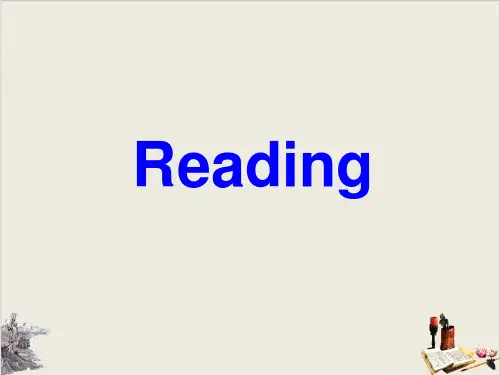
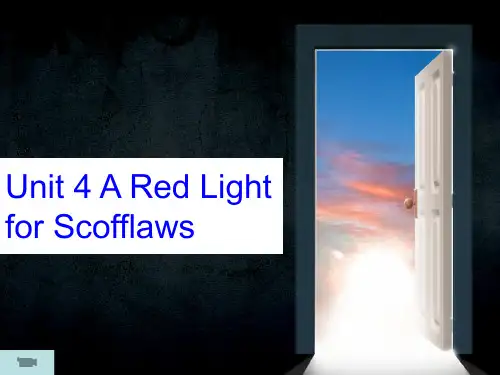
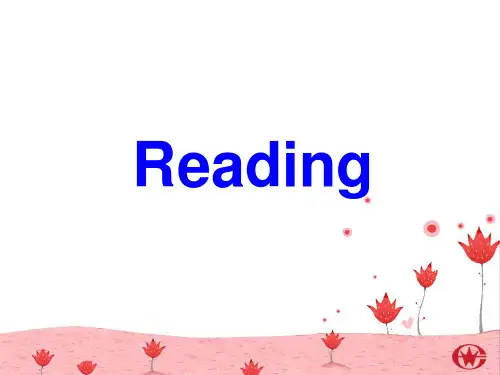

A Red Light for Scofflaws给轻微违法行为亮红灯 1take liberties with: misinterpret; treat something freely, without strict observance of the fact (随意对待) behave in a bold or impolite way towards,2.Outlaw litter:unlawful stewing (a place) with rubbish3.illicit noise:very loud noise which is not permitted4. motorized anarchy:disorder or chaos created by motorists5.take to: to be pleased by or attracted to; begin to do sth. as a regular habit6.dereliction:deliberate eglect;a tendency to be negligent ;7.exempt from: not affected or bound by (=excused)8.flurry: porfusion.abundance; great quantity9.ordinance: authoritative law,command or order; a regulation10. pot smoker:One who smokes marijuana.大麻烟客11.duck out of: avoid doing, esp. by making an excuse (=back out)12.fare beater:one who evades paying the fare on a public vehicle. “Beat” is U.S. slangmeaning “cheat”13. public nuisance:sth. offensive to the community, esp. in violation of others’ legalrights14.toss-up:the tossing-up of a coin to decide something by its fall15. mortal peril:danger that causes or is liable to cause death16.brazen: shameless.17.skirt:ignore; avoid; evade18.subvert: destroy the power and influence19.nullify: make ineffective; invalidateLaw-and-order is the longest-running and probably the best-loved political issue in U.S. history. Yet it is painfully apparent that millions of Americans who would never think of themselves as lawbreakers, let alone criminals, are taking increasing liberties with the legal codes that are designed to protect and nourish their society.法律和秩序,可以说是美国历史上历时最久、或许还是人们最爱谈论的政治问题。
READING TASKSTHE EARTH IS BECOMING W ARMER — BUT DOES IT MATTER?Pre-reading activitiesTask I. Do you think the climate is becoming warmer and warmer every year? State your feelings to your partners.Task II. Do you think the earth is becoming warmer because of human activities?Task III. How do you understand “greenhouse effects”?While-reading activitiesTask I. Read the text and fill in the chart below.Task II. Join the correct parts of the sentences together.1. Sophie Armstrong A. helps to keep the earth warm enough for people to live in.2. Carbon dioxide B. researched the reason and effect of the rapid change of theearth’s temperature.3. The greenhouse effect C. is the most important of “greenhouse” gases.4. Charles Keeling D. thought that global warming would be a good thing forhuman beings.5. Janice Foster E. predicted how warmer the earth would become in the next100 years.6. George Hambley F. recorded the amount of carbon dioxide in the air from 1957to 1997.Task III. Decide which are opinions (O) and which are facts (F).( ) 1. Coal, natural gas and oil are fossil fuels.( ) 2. The “greenhouse effect” is a natural phenomenon.( ) 3. The “greenhouse effect” makes our life worse.( ) 4. The amount of carbon dioxide increased from about 315 parts to about 370 parts per million from 1957 to 1997.( ) 5. Global warming will have a serious effect on human beings.( ) 6. It is not necessary to worry too much about the high level of carbon dioxide.( ) 7. More carbon dioxide will help produce more crops.( ) 8. The earth’s climate will continue to become warmer.Post-reading activitiesTask I. Below is a summary of the text with some words missing. Choose the words from the box and make the summary complete. Then try to retell the story to your partners.cold, diseases, carbon dioxide, warmer, greenhouse, 5The burning of things like natural gas and oil produces gases like 1. ________. These gases trap heat from the sun causing a “2. ________ effect”. Small amounts of these gases are good as without them the earth would be too 3. ________. However human activities are producing too much of these gases and they are causing the earth to become 4. ________. Some scientists say that over the next hundred y ears “greenhouse gases” could warm the earth by as much as 5. ________ degrees Celsius. Some say this would cause floods, droughts and the spread of 6. ________. Others say it would be good for plants and animals. One thing is certain, though, even if the amount of “greenhouse” gases being produced is reduced, the earth will continue to get warmer. (By Ray Cama)Task II. Describe the process of the rising of the earth’s temperature because of the “greenhouse effect”.Task III. Debate. Divide your group into two sides, one agreeing that a 5 degrees increase of the earth’s temperature will lead to a great catastrophe, the other group opposing to it. Each side should state your reasons and try to defeat the other side.Task IV. What can you do to slow down the speed of global warming?参考答案:Pre-reading activitiesTask I. 略Task II. 略Task III.略While-reading activitiesTask I.1. fossil fuels 2. go up 3. 370 4. mild 5. extreme climate 6. betterTask II. 1-B 2-C 3-A 4-F 5-E 6-DTask III. 1. F 2. F 3. O 4. F 5. O 6. O 7. O 8. OPost-reading activitiesTask I. 1. carbon dioxide 2. greenhouse 3. cold 4. warmer 5. 5 6. diseasesTask II. 略Task III.略Task IV. 略。
Ⅰ.读句品词——阅读下列句子,写出加黑单词的词性及汉语意思1.Our school advocates exchanging ideas with others frequently.v t.提倡;主张其他意义:n.拥护者;主张者2.The librarian has subscribed to several magazines up to now. v.订阅其他意义:v.同意;捐赠;捐助3.The young man is so aggressive that he often ignores the consequences of his actions.n.结果;后果4.We shouldn’t ignore the phenomenon where little children are under great stress. n.现象Ⅱ.语境填词背一背1.flood n.洪水;水灾2.range n.种类;范围3.glance v i.看一下;扫视n.一瞥4.steady adj.平稳的;持续的;稳固的5.widespread adj.分布广的;普遍的6.average adj.平均的7.circumstance n.环境;情况8.electrical adj.电的;与电有关的练一练[从左栏中选择合适的单词并用其正确形式填空]1.The young doctor did some research on a wide range of mental diseases.2.Under no circumstances will the old man have a prejudice against the poor.3.The young man was so embarrassed that he couldn’t keep breathing steadily.4.The leader glanced at the timetable on the wall and decided to quit his plan.5.Several houses were carried away during the flood and some people became homeless.Ⅲ.拓展提升背一背1.consume v t.消费;消耗;耗尽;吃完→consumer n.消费者;用户;消耗者→consumption n.消耗(量)2.tend v i.趋向;易于;照顾v t.照顾;护理→tendency n.趋向;趋势3.oppose v t.反对;反抗;与(某人)较量→opposed adj.反对的;对立的4.state v t.陈述;说明→statement n.陈述;声明5.existence n.生存;存在→exist v.存在;产生6.pollution n.污染;弄脏→pollute v t.污染7.growth n.增长;生长→grow v.生长8.refresh v t.使恢复;使振作→refreshing adj.令人精神振作的→refreshed adj.感到精神振作的9.educator n.教育工作者;教育家→educate v t.教育→education n.教育10.contribution n.贡献→contribute v.贡献练一练[用所给单词的正确形式填空]1.As an educator,we should take teaching and educating as our duty.(educate)2.They issued a statement in the newspaper,in which they stated their views on the case.(state) 3.She seemed opposed to your going abroad very much but her opposition didn’t work.(oppose) 4.I firmly dislike the tendency(tend) to regard money more highly than the quality of life.5.He drank some cold water to refresh himself and finally he was able to get refreshed.(refresh) Ⅳ.选词填空背一背1.come about发生;造成2.subscribe to同意;赞成;订购3.quantities of大量的4.go up上升;增长;升起5.result in导致6.be opposed to反对……7.keep on继续8.on the whole大体上;基本上;总的说来9.on behalf of代表……一方;作为……的代言人10.put up with忍受;容忍练一练[从左栏中选择合适的短语并用其正确形式填空]1.There is no need to put up with the pollution here even if you love the place very much. 2.The boy,on behalf of his school,is appealing to the students to quit computer games.3.On the whole,our stay was very pleasant and the people there were very friendly.4.Some support the new rule while I’m one of those who are opposed to it.5.The snow lasted a week,resulting in a serious traffic confusion in the whole area.6.How did it come about that such a confident person was so awkward on that occasion?Ⅴ.仿写运用背一背1.There is no doubt that the earth is becoming warmer...毫无疑问,地球正在变暖……2.Even if we start reducing the amount of carbon dioxide and other greenhouse gases,the climate is going to keep on warming for decades or centuries.即使我们开始减少二氧化碳和其他温室气体的含量,在(未来)几十年或几个世纪内,气候仍会持续转暖。
A Red Light for Scofflaws给轻微违法行为亮红灯 1take liberties with: misinterpret; treat something freely, without strict observance of the fact (随意对待) behave in a bold or impolite way towards,2.Outlaw litter:unlawful stewing (a place) with rubbish3.illicit noise:very loud noise which is not permitted4. motorized anarchy:disorder or chaos created by motorists5.take to: to be pleased by or attracted to; begin to do sth. as a regular habit6.dereliction:deliberate eglect;a tendency to be negligent ;7.exempt from: not affected or bound by (=excused)8.flurry: porfusion.abundance; great quantity9.ordinance: authoritative law,command or order; a regulation10. pot smoker:One who smokes marijuana.大麻烟客11.duck out of: avoid doing, esp. by making an excuse (=back out)12.fare beater:one who evades paying the fare on a public vehicle. “Beat” is U.S. slangmeaning “cheat”13. public nuisance:sth. offensive to the community, esp. in violation of others’ legalrights14.toss-up:the tossing-up of a coin to decide something by its fall15. mortal peril:danger that causes or is liable to cause death16.brazen: shameless.17.skirt:ignore; avoid; evade18.subvert: destroy the power and influence19.nullify: make ineffective; invalidateLaw-and-order is the longest-running and probably the best-loved political issue in U.S. history. Yet it is painfully apparent that millions of Americans who would never think of themselves as lawbreakers, let alone criminals, are taking increasing liberties with the legal codes that are designed to protect and nourish their society.法律和秩序,可以说是美国历史上历时最久、或许还是人们最爱谈论的政治问题。
然而,说来痛心,显然有成百万从来没有想过自己会违法——更不用说犯罪——的美国人,对于遵守那些旨在保护和维持他们的社会的法律条文,却愈来愈表现得放肆起来。
Indeed, there are moments today — amid outlaw litter, tax cheating, illicit noise and motorized anarchy —when it seems as though the scofflaw represents the wave of the future. Harvard Sociologist David Riesman suspects that a majority of Americans have blithely taken to committing supposedly minor derelictions as a matter of course.Already, Riesman says, the ethic of U.S. society is in da nger of becoming this: “You're a fool if you obey the rules.”今天,随处乱扔拉圾、逃税、违禁噪音,以及开汽车的无序状态,真是比比皆是;有时简直使人觉得,践踏法令者似乎代表了未来的潮流。
哈佛大学的社会学者戴维•里斯曼认为,大多数美国人都不以为然、毫无顾忌地喜欢犯些所谓的小过失。
里期曼说,今天美国社会的道德规范已差不多快变成“谁守法谁就是傻瓜”了。
Nothing could be more obvious than the evidence supporting Riesman. Scofflaws abound in amazing variety.The graffiti-prone turn public surfaces into visual rubbish. Bicyclists often ride as though two-wheeled vehicles are exempt from all traffic laws. Litterbugs convert their communities into trash dumps.里斯曼的论断,随处都可得到极为充分的证实。
玩忽法令者形形色色,令人吃惊。
喜欢在公共场所乱涂乱写的人,把这些地方弄得满目疮痍。
骑自行车无拘无束,仿佛两轮车就可以不遵守交通规则似的。
随处乱扔拉圾的人把他们的居住区变成了拉圾堆。
Widespread flurries of ordinances have failed to clear public places of high-decibel portable radios, just as earlier laws failed to wipe out the beer-soaked hooliganism that plagues many parks.Tobacco addicts remain hopelessly blind to signs that say NO SMOKING. Respectably dressed pot smokers no longer bother to duck out of public sight to pass around a joint. The flagrant use of cocaine is a festering scandal in middle and upper-class life. And then there are (hello, everybody!) the jaywalkers.到处张贴的禁令,也未能使公共场所免于手提收音机的高分贝噪音的污染,正如早先颁布禁令,禁止喝饱啤酒的流氓滋扰公园,竟毫无作用一样。
烟草瘾君子对那些“禁止吸烟”的布告牌熟视无睹。
衣冠楚楚的大麻烟客传递毒品也不再躲躲闪闪,避人耳目。
可卡因毒品泛滥,成了中上层社会中愈来愈恼人的丑闻。
当然,还有那些不遵守交通规则,乱穿马路的人。
The dangers of scofflawry vary widely. The person who illegally spits on the sidewalk remains disgusting, but clearly poses less risk to others than the company that illegally buries hazardous chemical waste in an unauthorized location. The fare beater on the subway presents less threat to life than the landlord who ignores fire safety statutes. The most immediately and measurably dangerous scofflawry, however, also happens to be the most visible.践踏法令的危害有轻有重。
在人行道上随地吐痰,当然是令人讨厌的;但与那些大工厂在非指定地点违法掩埋危险的化学废料的作法相比,其对公众的危害则要小多了。
乘地铁不买票,当然不会像房东老板无视防火安全条文那样会危及人的生命安全。
然而正是这些极常见的践踏法令行为的危害却最直接最明显。
The culprit is the American driver, whose lawless activities today add up to a colossal public nuisance.The hazards range from routine double parking that jams city streets to the drunk driving that kills some 25,000 people and injures at least 650,000 others yearly. Illegal speeding on open highways? New surveys show that on some interstate highways 83% of all drivers are currently ignoring the federal 55 mph speed limit.罪魁祸首要算那些无法无天的美国司机,其所做所为积累成今天的巨大公害。
这种危害包括致使交通阻塞的常见的路边双排停车和导致每年车祸死亡 25,000 人、受伤至少 65 万人的酒后开车。